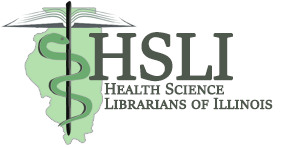As a recipient of the 2018 Syed Maghrabi Scholarship to attend the HSLI conference this year, I would like to offer my thanks: to the scholarship review committee, to those who donate to the scholarship fund, and to the memory of Syed Maghrabi. HSLI 2018: Rivers of Data, Streams of Knowledge was the third HSLI conference I’ve attended. To me, the highlights of HSLI Annual are: (1) the ease with which I am able to connect with librarians, and (2) the programming that is relevant across sectors – as an academic science liaison librarian, I feel like I fit right in. The theme of this year’s conference – data management – proves this cross-sector relevance.
Librarians, myself included, are needing to add familiarity with data management to our jack-of-all-trades skill set. To this end, Dr. Kristi Holmes’ keynote address discussed ways librarians can assist in the research life cycle. Her suggestions both to set incremental goals (today, next week, this year) to advance one’s awareness about data management and to develop a communication plan resonated with me. I am a firm believer in articulating goals to help focus my work. Today, I might read an article about data management; next week, I might talk with a science faculty member about how they manage their data and whether our institutional repository would be of use to their needs.
In both break-out sessions that I attended, participants were asked to write down our goals. (Yay, more goal setting! I have found that this time for self-reflection really helps in my ability to bring home what I learn at conferences.) In Data Management in the Wild, Erin Foster asked us to consider where there are gaps in the data services we provide and what resources we might need to develop the services we provide. For a more comprehensive view of data management services, I will be browsing the book she recommended, Margaret Henderson’s Data Management: A Practical Guide for Librarians (2017).
In Building Partnerships with Faculty, Clinicians and Other Stakeholders, Gwen Wilson helped attendees develop an action plan to take back to our own institutions. Participants brainstormed opportunities for partnerships and considered suggestions for overcoming barriers and sustaining partnerships. The goals I set for myself are to be strategic and intentional in fostering partnerships. Our teaching faculty are overwhelmed by their workload. Not everyone has the time to devote to developing a relationship with their librarian. By serving on relevant committees, making myself visible by roaming the halls of the departments or attending departmental events, and reaching out to new faculty and faculty developing new programs and courses, I see where I can target my efforts to improve my successes in building partnerships. By engaging faculty in conversations, I can offer more targeted recommendations for appropriate library services for their needs. I also valued our discussion about self-care and recognizing when we’ve burned the candle at both ends; as librarians, we don’t have to overburden ourselves with outreach, but we do need to participate.
New to the conference program this year, four librarians provided quick tips in rapid succession during their lightning talks. Thanks to Cynthia Ehret Snyder, Liesl Cottrell, Emily Gilbert, and Ramune Kubilius for energizing us late in the day on Thursday. I especially enjoyed hearing Emily’s experience in working exclusively with online programs and her suggestions for reaching out to faculty.
This year, I presented a poster, “Improve ILL Workflows with this OA Search Tool,” and I was grateful to have the chance to talk with so many colleagues who stopped by to learn about this research. I will be using feedback from our discussions to inform the manuscript that I’ll be writing on the same topic. As the Legislative Committee co-chair, I presented this year’s legislative report during the board and business meetings. Tracking legislative news isn’t something I’m naturally inclined to do, so serving as co-chair has been a nice incentive to intentionally browse headlines every few weeks and report on pressing legislative issues.
Thanks to the members of the conference planning committee. Rivers of Data, Streams of Knowledge was yet another enjoyable HSLI conference.
